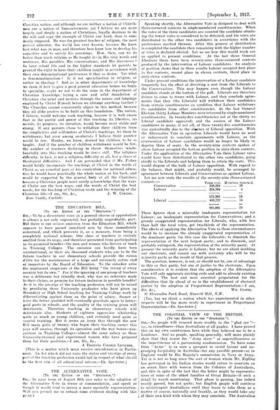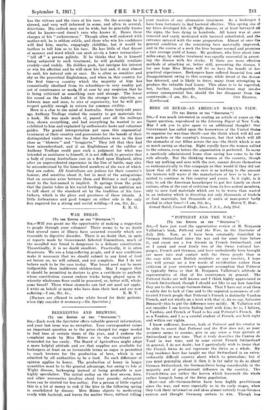THE COLONIAL VIEW OF THE BRITISH.
(To ran EDITOR OF run " SPLOTATOR.'1 Smw,—No people will respond more readily to the "glad eye "— i.e., to friendliness—titan Australians of all grades. I have proved this on my own countrymen hero while they believed me to be a Londoner. And no people, speaking generally, will more plainly show that they resent the " stony stare " of superciliousness or the impertinence of a patronizing condescension. To have come from " hems is es sure a passport to social favour and un- grudging hospitality in Australia—for any possible person—as in England would be His Majesty's commission in Navy or Army. Yet it is not no long since the sort of woman whom Mr. Kipli»g has portrayed in his Indian stories would refuse to associate on an ocean liner with women from the Colonies of Australasia, end this in spite of the fact that the latter might be representa- tives of some of the oldest families of Great Britain—if such a detail be worth mentioning. That phase is passing, has indeed nearly passed, but not quite; but English people will continue to misinterpret Australians until they learn to take them ft13 matter of course, naturally end frankly, as they would take any of their own kiud with whom they may associate. The Australian has the virtues and the vices of his race. On the average he is shrewd, and very well informed in some, and often in several, directions. His outlook may not be wide, but he generally knows what he knows—and doesn't care who knows it. Hence these charges of his "cocksurenees." Though often well endowed with mother-wit, he is seldom subtle, and those who win his confidence will find him, maybe, engagingly, childlike, but it would be tactless to tell him so to his face. He has little of that finesse of manner and word which can snub or—in a lower vernacular- " tell of " a person politely. If he thinks that he is himself being subjected to such treatment, he will probably retaliate crudely—and rudely. He dislikes gush, but intrigue his interest or win his affection and he will show his best and, it may almost be said, his natural side at once. He is often as sensitive and shy as the proverbial Englishman, and when in this country for the first time—a country which the majority of him has romantically idealized from its schooldays—is very readily put out of countenance or made ill at ease by any suspicion that he is being criticized as something rare and strange. The lower his round on the ladder of life the stronger his objection, as between man and mon, to airs of superiority, but he will give respect quickly enough in return for common civility.
Here is a clue to the mind of Australia. Some forty-odd years ago Anthony Trollopo visited the country to get materials for a book. He was made much of, passed over all the railways free, shown everything, and had everything he wanted to see exhibited to him and explained by enthusiastic hosts and volunteer guides. The genial interpretation put upon this exponential treatment of their country and possessions for the benefit of their distinguished visitor was that the Australians were in the first class as " blowers " and " braggarts." They felt that they had been misunderstood; and if an Englishman of the calibre of Anthony Trollope could pass such a judgment for what was intended as assistance to himself, it is not difficult to perceive that a body of young Australians cast in a flood upon England, often after an unprecedented experience in the line of battle, may also be misunderstood by the home-bred members of the rare of which they are cadets. All Australians are jealous for their country's honour, and sensitive about it, but in most of the antagonisms that on occasion nrise between them and Britons a real compli- ment to the last-named is implicit. It springs from the pride that the junior takes in his racial heritage, and his ambition not to fall short of the standard set by the tradition of his fore- fathers, which is the glory and greatness of these islands. A little forbearance and good temper err either side is the only flux required for a strong and useful welding.—I am, Sir, &c.,
E. R. G.



































 Previous page
Previous page